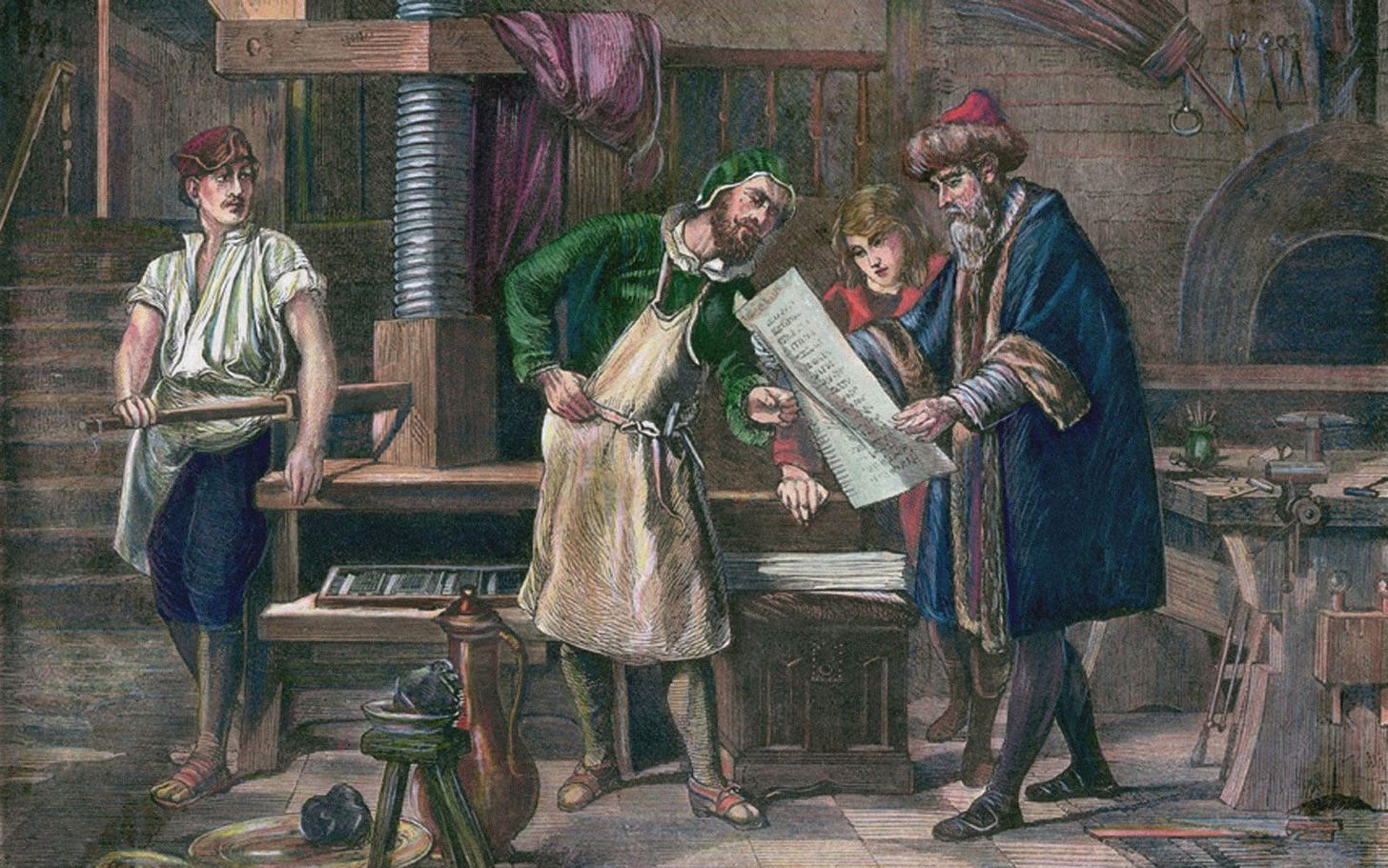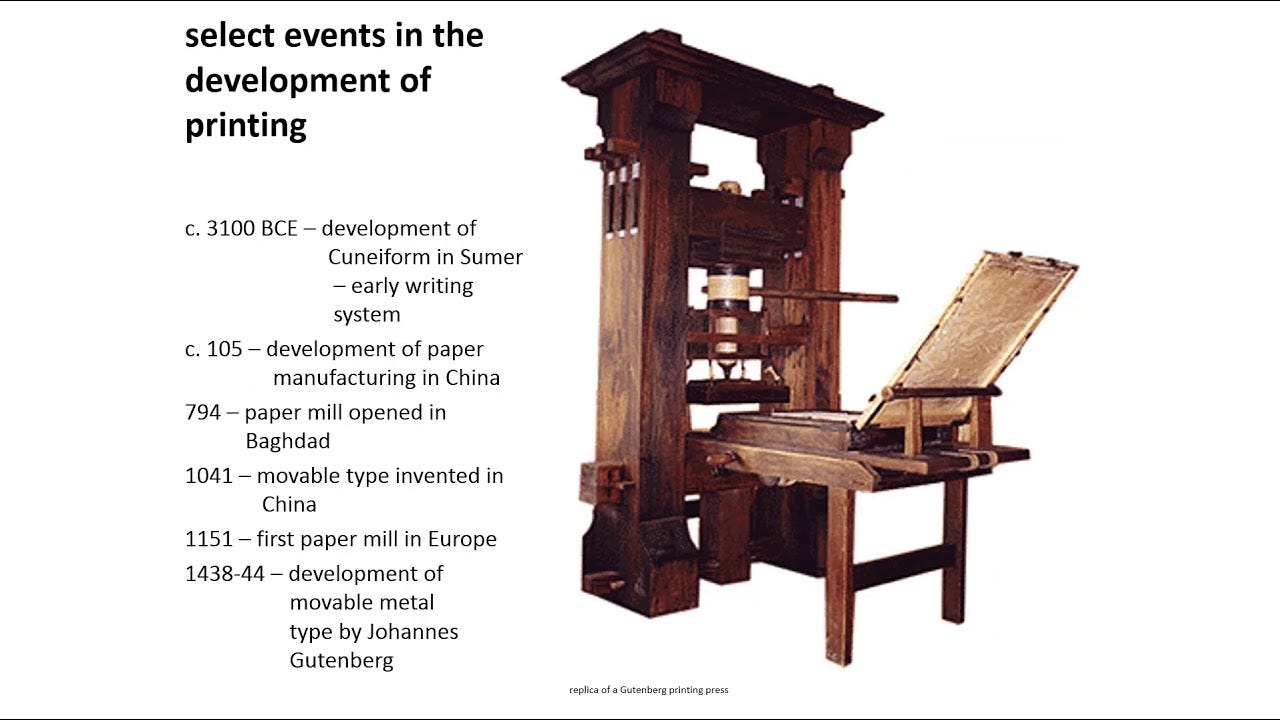VOL 56: The Printing Revolution: How the Gutenberg Press Shaped the Renaissance
Discover the groundbreaking invention of the Gutenberg printing press and its impact on society during the Renaissance.
Hey Friends 🤓,
Trust you all had a great start to the year. 🤗

Today at a Glance:
IntroductionA brief overview of the life and work of Johannes GutenbergImportance of the printing press in the RenaissanceWhy the printing press is the greatest invention?Concluding thoughts on the impact of the Gutenberg printing pressPast Greats 👴Random Tech FactsTweet of the Week
Quote of The Week
“It has become appallingly obvious that our technology has exceeded our humanity.”
— — —
Albert Einstein
Introduction
The invention of the Gutenberg printing press by Johannes Gutenberg had a profound impact on society and shaped the world as we know it today. The printing press is widely considered one of the most important technological advancements in human history. It revolutionized the way information was disseminated, paving the way for the widespread dissemination of knowledge and ideas. The man behind this invention was Johannes Gutenberg, a goldsmith and inventor from Germany.
During the Renaissance, the printing press had a profound impact on society, shaping the cultural and intellectual landscape of Europe. With the ability to mass-produce books, the printing press spurred the spread of knowledge and information, leading to a revolution in education and politics. As a result, the Renaissance saw a flowering of the arts, sciences, and humanities, as well as a new era of humanistic thought and intellectual inquiry. This article will examine the life and work of Johannes Gutenberg, the design and construction of the printing press, and its lasting impact on the world.
A brief overview of the life and work of Johannes Gutenberg
Johannes Gutenberg was a German goldsmith and inventor who is best known for his role in the development of the printing press. Born in the 14th century in Mainz, Germany, Gutenberg was raised in a wealthy family and received a comprehensive education. He later became a goldsmith and developed an interest in printing and the mechanics of movable type.
Gutenberg's invention of the printing press was the result of many years of experimentation and trial and error. He designed a press that used a movable metal type and a pressing mechanism, allowing for the mass production of books. In 1455, Gutenberg produced the first printed book, the Gutenberg Bible, which is considered one of the greatest works of typography in history.
The invention of the printing press had a profound impact on society, and Gutenberg is often referred to as the "Father of the Printing Press". His innovative technology facilitated the spread of knowledge and ideas, leading to the cultural and intellectual flowering of the Renaissance. Although his exact birth and death dates are not known, Gutenberg's legacy lives on, and he is widely recognized for his contributions to the field of printing and its impact on the world.
Importance of the printing press in the Renaissance
The printing press was of great significance during the Renaissance, a period of cultural and intellectual awakening that took place in Europe from the 14th to the 17th century. The printing press allowed for the mass production of books, making information and knowledge much more widely available. This was especially important during the Renaissance because it facilitated the spread of ideas and new thinking, which was a driving force behind the cultural and intellectual developments of the time.
Before the invention of the printing press, books were laboriously copied by hand, making them expensive and rare. With the printing press, however, books could be produced quickly and inexpensively, leading to a revolution in education and literacy. This allowed for a greater number of people to have access to books and knowledge, and it also made it possible to produce and distribute new works in many different fields, such as science, philosophy, and the arts.
The printing press also played a role in the spread of new political and religious ideas, which challenged the established order and helped spark the Protestant Reformation. In short, the printing press was a major catalyst for change during the Renaissance, and its impact was felt throughout Europe and beyond, shaping the world as we know it today.

Why the printing press is the greatest invention?
The printing press is often considered one of the greatest inventions in human history for several reasons:
Spread of knowledge: The printing press made it possible to quickly and easily produce and distribute books and other written materials, leading to a revolution in education and literacy. By making information widely available, the printing press facilitated the spread of knowledge and ideas and helped to shape the modern world.
Democratization of information: Before the printing press, information was controlled by the ruling elites, who had a monopoly on the dissemination of information. With the advent of the printing press, however, information could be distributed more widely, leading to a more informed and politically active population.
Cultural and intellectual development: The printing press played a role in the cultural and intellectual flowering of the Renaissance, making it possible for new ideas and information to be quickly and easily disseminated.
Historical significance: The printing press was a catalyst for change, and its impact on the world cannot be overstated. The invention of the printing press marked a turning point in human history, paving the way for the modern era of information dissemination and communication.
Technological innovations: The printing press was a technological marvel in its own right, combining intricate mechanical components with an understanding of materials science, chemistry, and optics. The printing press represented a major step forward in the technological evolution of human society, and its legacy lives on as a testament to human ingenuity and innovation.
Concluding thoughts on the impact of the Gutenberg printing press
In conclusion, the Gutenberg printing press was a groundbreaking invention that had a profound impact on the world. By making books widely available and easily accessible, the printing press facilitated the spread of knowledge and ideas, leading to the cultural and intellectual flowering of the Renaissance. The printing press also played a role in the spread of new political and religious ideas, which challenged the established order and helped spark the Protestant Reformation.
The invention of the printing press had a lasting impact on society, shaping the world as we know it today. The mass production of books made information and knowledge much more widely available, leading to a revolution in education and literacy. The printing press also paved the way for the modern era of information dissemination, making it possible for new ideas and information to be quickly and easily distributed.
Today, the printing press may seem like a quaint relic of the past, but its impact on the world cannot be overstated. Gutenberg's invention was a catalyst for change, and its influence can still be felt in the world of information dissemination and communication. The printing press changed the way people thought, learned and communicated, and its legacy lives on as a testament to the power of human invention and innovation.
PAST GREATS
Jeremy Bentham (February 1748-June 1832)
Jeremy Bentham was a British philosopher, economist, and social reformer who lived from 1748 to 1832. He is best known for his work in the field of utilitarianism, which holds that the best action is the one that results in the greatest overall happiness for the greatest number of people. Bentham argued that society should be structured to promote the greatest happiness for the greatest number of people and that this could be achieved through the implementation of laws and policies that promote the welfare of the majority.
Throughout his life, Bentham was an outspoken critic of the status quo and a strong advocate for social reform. He wrote extensively on a wide range of subjects, including prison reform, the abolition of slavery, the rights of women and animals, and the establishment of a national system of education.
He was also a prolific writer and produced a large body of work, including his famous book "An Introduction to the Principles of Morals and Legislation," which is considered to be one of the foundational works of utilitarianism. Despite his many contributions to the field of philosophy and his efforts to bring about social change, Bentham is perhaps best remembered as a charismatic and eccentric figure who lived life on his terms.
Random Tech Facts
As of 2022, there are 5.1 billion Internet users, and 4.5 billion of them access it on their mobile phones.
Tweet of The Week
Enjoyed this piece? Please let me know by hitting the ❤ button. It brightens my day to see if my readers enjoy the content (it really does!). Thank you so much!
Enjoy your weekend.







